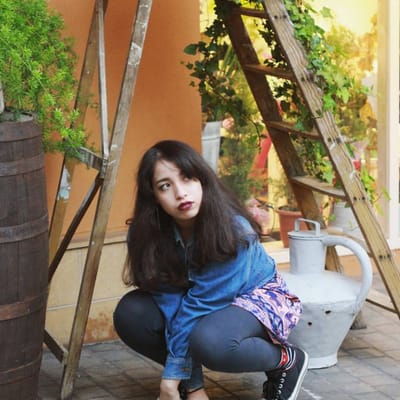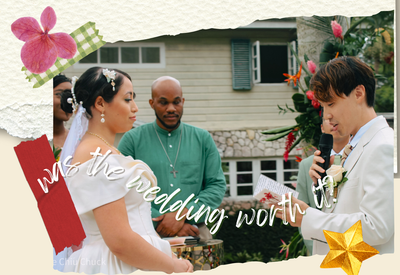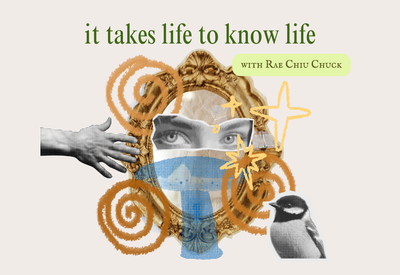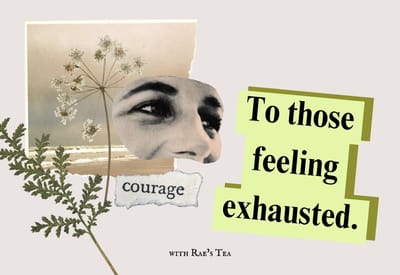👁️ Vision
There's something we don't talk about enough when we discuss success, achievement, or even basic human flourishing. We obsess over skills, qualifications, networking, and strategy. We measure ourselves in degrees earned, languages spoken, and connections made. But we rarely examine the invisible architecture that determines what we even believe is possible—the quiet force that sets the boundaries of our entire world.
Your vision.
Not the vision you write on vision boards or recite in job interviews. I'm talking about something much more fundamental: your practical understanding of how the world works, your intuitive grasp of what's achievable, your lived knowledge of what exists beyond your immediate reality. This vision, this way of seeing, is your potential.
And here's what changes everything: it's not fixed.

The Apple doesn't fall far from the tree.
We like to tell ourselves stories about being self-made, pulling ourselves up by our bootstraps, and becoming entirely our own people through sheer force of will. But the apple doesn't often fall far from the tree, as we say, and even when it rolls away, it doesn't venture far from its origins.
We're not as blank of a slate as we think. We're not starting from zero. We are living continuations of every choice our ancestors made, every skill they developed, every vision they held about what was possible. We are products of our environment, of the nature around us, of the popular politic opinions of the time. The way we see the world, the opportunities we notice, the solutions that feel natural to us—these aren't random discoveries. They're inheritance.
If you were born on land, you'd have vision for what land can do. You'd see gardens where others see dirt. You'd understand the complex dance of crop rotation that nurtures soil across generations. You'd know, in your bones, how to coax abundance from earth.
I wasn't born on the land. I was born on a shop floor.
Growing up Chinese-Jamaican, I spent a good chunk of my childhood in my family's pharmacy and supermarket, playing market in the garden section, watching my elders lead teams, support staff, bargain for deals, walk-through trade-shows, stage fundraisers, and show up at ungodly hours on Black Friday in the US to buy goods to send down to Jamaica. Witnessing their tenacity, their compassion and their ability to take scattered elements and sheer willpower and weave them into a sturdy business, income streams and community projects, is a huge part of who I am today. This wasn't (colonised) business school theory—this was vision, inclusion at scale, transmitted through experience, through proximity, through the simple act of being present while possibility unfolded.
The beauty and curse of this inheritance is that you don't choose it. You absorb it. Your environment doesn't just shape your skills; it shapes your understanding of what skills are worth developing, what dreams are worth pursuing, what reality looks like when you're brave enough to reach for it.
This is why parents exhaust themselves trying to get their children into better schools, richer neighbourhoods, expanded experiences. They know something profound: exposure expands potential. They understand that vision is not just what you can imagine—it's what you can believe is achievable because you've seen it done.

The Bounds of the Possible
Vision is the limitation of our potential.
Think about it: you cannot pursue what you cannot envision. A child who grows up seeing only struggle will have a different relationship with abundance than one who watched their grandfather turn ideas into empires. A young person surrounded by people who view creativity as luxury will approach their artistic gifts differently than one raised where art and commerce dance together. Often what stops someone from living their dreams isn't a lack of resources, but a lack of imagination.
This isn't about judgment, but instead understanding the invisible borders that shape our lives. Knowing this, we have the agency to stretch our limits and even surpass them. This knowledge also helps us to have more compassion and understanding for those who may not have had as much exposure as we have. Vision, is a gift after all.
When I went to China for the first time, I had the pleasure of tracing back my roots to a small village outside of Shenzhen where my great-grandparents, and many other Chinese-Jamaicans, began life. It wasn't hard for me to get there because my Aunt had a home there with her mother that I had access to stay at. The funniest thing about that was, it's her husband (born in Jamaica) who is my blood relative, and therefore somehow he managed to arrange a wife from our ancestral village. This shows you how close our ties with China are, even after being in Jamaica for several generations.
Going there, I could suddenly see how Chinese infrastructure, Chinese understanding of community building, and a Chinese vision for what society could look like had been quietly transplanted and infused into Jamaica through generations of immigrants who knew exactly where they came from. They carried blueprints in their minds—not just hopes, but practical knowledge of how things could work because they'd seen them working elsewhere. They could envision success because success wasn't abstract to them; it was memory.
This is a crucial difference between those who have the baseline ingredients for opportunity and those who struggle against invisible ceilings. It's not intelligence. It's not talent. It's vision—the deeply practical understanding that certain possibilities are real because you've witnessed their reality. This is a privilege I always try to remind Asian-Americans (continental) about. There is a reason we are the "model" minority. This is why Pan-Africanism is so crucial to our nation's growth, and why Marcus Garvey was such an inspiration. He helped bring back vision to a people robbed of it.
As Fate 👁️ Would Have It
"The most beautiful thing we can experience is the mysterious. It is the source of all true art and all science." — Albert Einstein
Consider the child raised by a Jamaican grandmother and Italian grandfather, each trying to outdo the other in their respective kitchens.
"Mi ready fi bet u seh nonna nuh cook oxtail like me, don't?" followed by,
"Coffee with the condensed milk?? Madonna 🤌🏻!"
This isn't just family banter, it's vision forming its first opinions. The child absorbs not just recipes but possibilities. On the one hand, they may seek resolution in themselves: fusion, tradition, innovation, the courage to blend worlds, the confidence to honour multiple lineages simultaneously. Maybe they open an Italian-Jamaican restaurant. Or on the other hand, they may feel called to reject the complexity of diversity altogether. Maybe they escape into another culture and marry someone who introduces them to Indian cuisine, expanding their palate beyond the binary choice always highlighted by their grandparents. The exact outcome matters less than the foundation—this child will move through life with a fundamentally different understanding of what's possible with food, culture, identity, and creative expression.
They've been gifted expanded vision, which means they've been gifted expanded potential.
Your Golden Inheritance
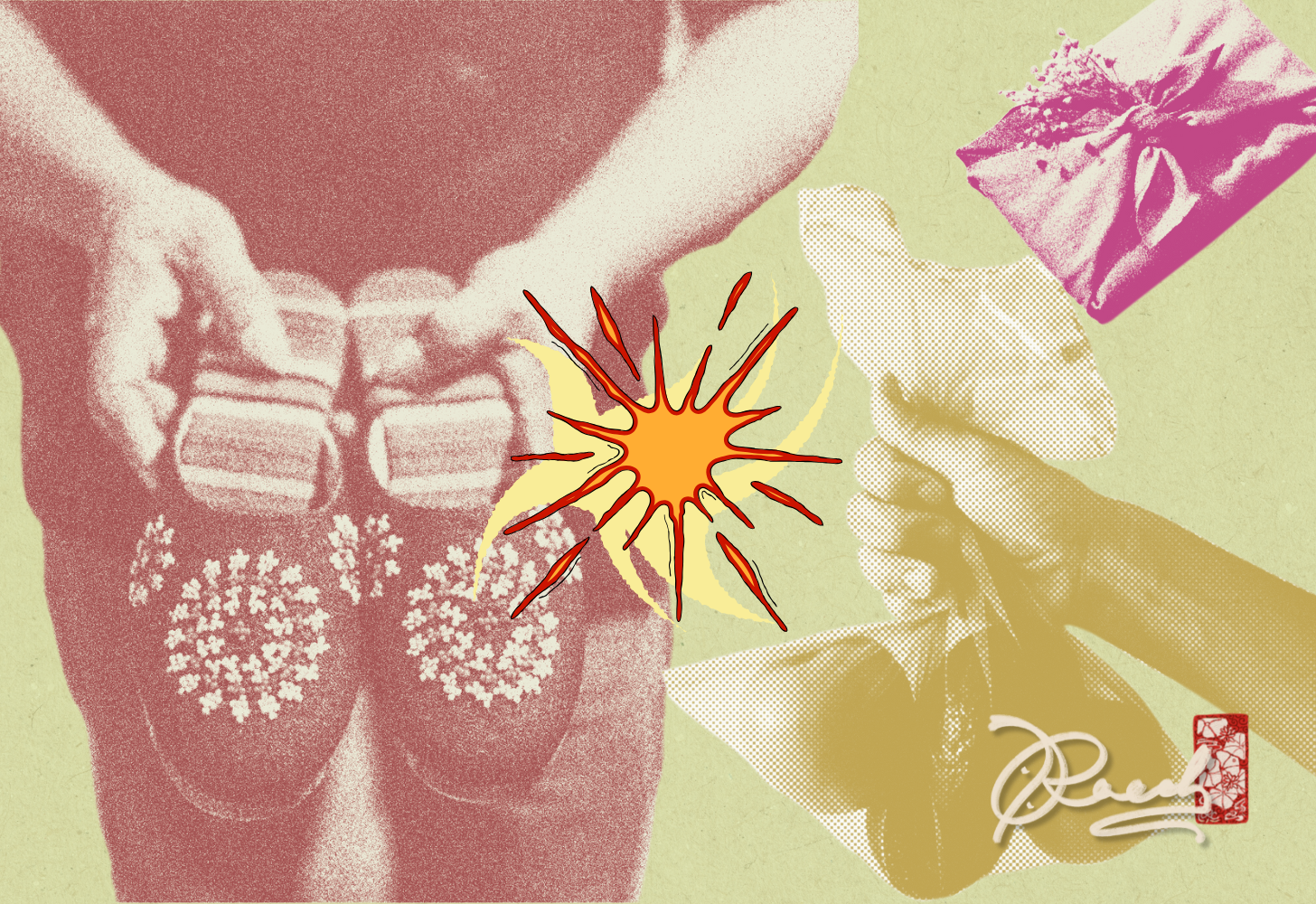
So if vision shapes our potential, and humans have free will to act on it or rebel against it, logic shows us that the greatest gift someone can give you is vision.
Not money, not connections, not even opportunities (though these matter). Vision. The stretching of your imagination beyond the borders of your immediate experience and the experiences of the people around you. After all, you can lead a horse to water, but you can't make it drink. Vision and potential are the only viable gifts you can offer to a free-thinking, agentic person without binding them to expectations of a life they haven't chosen yet.
Vision is a child's golden inheritance—and perhaps the most precious form of wealth that can be passed down.
The Theft of Context
Anthropologist David Graeber, in his exploration of debt and power throughout human history, observed that:
"Slavery is the ultimate form of being ripped from one's context, and thus from all the social relationships that make one a human being." He understood that we create conditions for oppression when people are judged without their context, stripped of their cultural framework for understanding their place in the world." — Debt: The First 5000 Years
But let's flip this insight: when we rob people of their golden inheritance—the vision of their ancestors, their understanding of their own value and possibilities—we create perfect conditions for manipulation. A person severed from their cultural transmission becomes a blank slate, vulnerable to having someone else's limited vision imposed upon them.
The cruelest aspect of historical oppression wasn't just physical bondage. It was the deliberate severing of cultural transmission, the systematic interruption of vision passing from generation to generation. When people cannot communicate their context, when they lose access to their ancestors' understanding of what's possible, they become vulnerable to systems that were never designed with their flourishing in mind.
Consider the difference: as brutal as the treatment of Asian migrant workers in the Americas was, Chinese and Indian indentured servants maintained something crucial—they knew where they came from. They could send children back to learn, could maintain connections that allowed knowledge, techniques, and most importantly, vision to flow from larger ponds to smaller ones across generations. This continuity of vision, this unbroken chain of possibility, became generational wealth in ways that compound far beyond money.
They carried blueprints in their minds. Not just cultural practices, but practical understanding of how communities function, how economies work, how to build systems that sustain themselves across time. This vision became infrastructure, became opportunity, became the foundation for thriving within new contexts whilst maintaining cultural integrity.
The Power of Multiple Contexts
Here's what I've learned from being a multicontext mongrel from birth: when you hold multiple perspectives simultaneously, you develop something like x-ray vision for cutting through the BS of artificial limitations.
Cultural, societal, and generational guilt and shame around "core expectations" become much harder to internalise when the cultures and social spaces you're exposed to often want completely opposite things. When your Chinese-Jamaican grandmother values one approach to success and your Afro-Jamaican community celebrates another, when your academic training points in one direction and your spiritual practice points in another, you're forced to develop your own synthesis rather than accepting any single perspective as absolute truth.
This isn't always comfortable.
In fact, it was painful growing up and feeling like I belong to no one and no where. But it gifts you with something invaluable: the ability to see that most "universal truths" about how life should be lived are actually just cultural preferences. And once you see that, you can choose more consciously which visions to inherit, which to adapt, and which to leave behind entirely.
The evidence shows that people who figure out how to transcend the expectations of "what is normal" often become the strongest amongst us. Physician and author Gabor Maté captures this beautifully: "As it turns out, it is often individuals who defy conventional normality who are the healthy ones." He goes on to explain what this defiance actually requires,
"It all starts with waking up: waking up to what is real and authentic in and around us and what isn't; waking up to who we are and who we're not; waking up to what our bodies are expressing and what our minds are suppressing; waking up to our wounds and our gifts; waking up to what we have believed and what we actually value; waking up to what we will no longer tolerate and what we can now accept; waking up to the myths that bind us and the interconnections that define us."
– The Myth of Normal by Gabor Maté, MD
This waking up—this conscious choosing between inherited visions—is exactly what multicontext existence forces you to do. You cannot sleepwalk through life when your very identity requires constant negotiation between different ways of seeing the world.
But if you are reading and feeling discouraged by the state of the world and the short-end of the stick you've been dealt, stay tuned, because vision is not static, nor fixed.
The Alchemy of
Experience & the Skill of Expansion
Vision as essential work beyond birthright.
When you understand that your capacity to envision possibility can be developed, you begin to see expansion as essential work. You start seeking experiences not just for pleasure or status but for the way they stretch your understanding of what's achievable out there for you. It's an important step in realising your own agency to create a life you life unbound by the limitations society and circumstance set for us.
You travel not as a tourist but as an anthropological student of life. You read not just for information but for glimpses into worldviews that might crack open new possibilities. You seek conversations with people whose experiences differ radically from your own, knowing that each exchange has the potential to shift your sense of the possible. In 2025, even without leaving one's home, we can traverse many 'worlds', see through many 'portals' and shift our realities if we let it happen.
My personal brand has shifted A LOT over the years from being a language learning productivity creator for students, and now somehow trying to flirt with mysticism, community organisation, activism and entrepreneurship. But even through all the changes, I still share a philosophy of polyglotism and promote language learning because I quite literally cannot think of a better way to expand one's vision. The very words we use are just hollow representations of the world we experience, when you learn a new language, it becomes quite clear that even concepts we talk about as science are subjective.
A few examples:
What is future?
Chinese languages and many West African languages as I've had described to me do not deal with time as a left to right linear flow. Some African languages do not even have a solid word for "future", as time is made up of lived moments, and a future with no ties to the present exists only in our imaginations. So as far as those languages are concerned, 'future' is a useless concept. In Chinese, there are no tenses and the language expresses time and will through the travelling of energy through space (locative)—how a thought or experience travels, where it originates, when it arrives, when it changed—completely different than English in a way that has profoundly impacted the way I live my life. It's hard to explain in [English] words, but it's a universal feeling for anyone who embarks on the journey of expanding their vision by learning about cultures vastly different from their culture of origin.
"Lol that's not a language"
Many, if not most Jamaicans, by the nature of British Colonialism believe that Jamaican Patwa (or just Jamaican as I lovingly call it) is not a language. The reasons they cite? It is spoken together with English (like Hindi or Malaysian Chinese), it is crudely simple (The Chinese word for astronaut is 'Too Big Sky Person'), it doesn't have rules (it does. otherwise, how would we understand each other?), or it's too similar to English to count (Swedish and Norwegian are literally mutually intelligible, to the point where you can speak the two languages back and forth on national television and no one bats an eye). Needless to say, as a human with a trained and expanded vision, I know that the bounds of language are defined by politics and nothing else. Jamaican is a language objectively.
I said a little earlier that vision is the greatest gift we can give a person. But the version of vision I am talking about in this article is beyond 'the sight' or the awareness of such things existing. It is the alchemy of experience, the combination of feeling yourself walk through different possibilities, seeing the emotions that come from them, learning what is worth it in life and what isn't. Learning above all else, that pursuing your potential (vision) is worth it, now and in the present.
Remember, contemplation involves more than just thinking about something. It is a living re-enactment of the patterns themselves. As you bring them to light, so your awareness can see them clearly for what they are – triggers that set off highly charged emotional issues. – Richard Rudd, The Venus Sequence
For example in my own life, I feel extremely grateful to my parents for bringing me on their adventures, for pushing me to work in the store, for giving me time to explore other avenues on my own and for letting me make my own mistakes. All of which, through the alchemy of experience, helped me to translate the vision I started with into real life applications, and expand the vision for more as I went. It empowered me to make informed decisions on what I was seeing in front of me, because I knew what each experience felt like, and what it produced. Even when I fought the vision my parents gave me, it was that vision that fuelled the exploration and expansion beyond Jamaica—to find that which could be better. Not everything that was in my vision was for me, but I was privileged to have a vision in the first place.
🎶 So I remember when we were driving, driving in your car, Speed so fast it felt like I was drunk, City lights lay out before us, And your arm felt nice wrapped 'round my shoulder, And I-I had a feeling that I belonged, I-I had a feeling I could be someone, be someone, be someone 🎶
—Fast Cars, Tracy Chapman

The Practical Poetry of Potential
and the takeaway.
Vision is practical understanding without all the details. It's knowing that something can work because you've seen it work, or rather you've seen something similar work, or disparate parts work independently and can imagine them whole. It's a kind of knowing, even if you don't yet know-know exactly how to make it work in your context. It's the confidence that comes from witnessing possibility made manifest, from understanding that the gap between dream and reality is navigable because others have navigated it before.
This is why exposure matters more than academic education, why experience trumps theory, and why the person who has lived the vision will always move with different energy than the person who has only heard about it.
But here's what I want you to remember: every person who has "seen it done" was once someone who hadn't. Every visionary was once someone whose vision was smaller than it became. Every person living a life that inspires you was once someone who couldn't yet imagine that life for themselves.
Vision grows. Potential expands. The boundaries of what you can see as possible for yourself are not fixed coordinates—they're living borders that shift as you gather new experiences, new perspectives, new understanding of how the world actually works. That is the poetry in vision, and dare I say, in life. It is largely up to us and what we allow to happen with our lives that will determine whether or not our visions come to life, grow, adapt, expand, or get hidden away up in the attic.
“It's the possibility of having a dream come true that makes life interesting.”
― Paulo Coelho, The Alchemist
This is practical mysticism—the understanding that expanding consciousness expands capacity.

If you made it to the end of this I want to personally thank you for giving my words some time. I'm on a mission to end the world as we know it, and kickstart humanity into a new phase– one that centres collaboration over competition and love as intrinsic motivation over materialism.
If you'd like to learn more about how I'm doing that, check out my website.
No spam, no sharing to third party. Only you and me.
